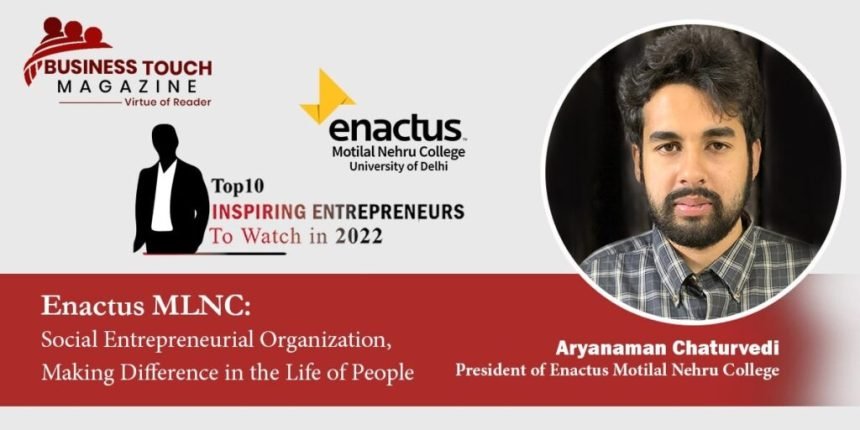Enactus stands for:
Entrepreneurial – igniting business innovation with integrity and passion
Action – the experience of social impact that sparks social enterprise.
Us – student, academic and business leaders collaborating to create a better world.
The NextGen Leaders of Enactus are passionate about making the oceans healthier, spoken word poems, dancing, circular economies, coding, photography, climate action and more. Plus, thousands of projects bring greater economic inclusion to their communities.
At Enactus National Events, these leaders demonstrate the real impact they are making on people, the planet and prosperity, as well as the even greater impact on themselves—becoming values-driven leaders, ready to lead their businesses or to become intrapreneurs within some of the world’s greatest companies.
Enactus is the world’s largest experiential learning platform dedicated to creating a better world while developing the next generation of entrepreneurial leaders and social innovators. The Enactus network of global business, academic and student leaders is unified by a vision—to create a better, more sustainable world.
Across 37 countries, 72,000 Enactus university students on 1,730 campuses are actively living as entrepreneurial, values-driven social innovators. Their commitment to action and outcomes is positively impacting the lives of 1.3 million people each year. Enactus Motilal Nehru College (Day) works under the mentorship of Enactus India, the Corporate Social Responsibility of KPMG, a global network of professional firms providing audit, tax and advisory services.
Enactus MLNC is a student-run social entrepreneurial organization and is an umbrella branch of Enactus India. Their main goal is to eradicate social evils and uplift the weaker sections of society. All their projects are driven by this unanimous goal.
Project DESI
Enactus Motilal Nehru College, which started in October 2014, is working on Project DESI. DESI stands for Duty to Empathize, Sterilize and Immunize stray dogs. Through this project, they wish to increase people’s participation in the Animal Birth Control (ABC) Program and eradicate rabies. Under the duty to Empathize, everyone must give care and love to stray dogs.
Under the duty to Sterilize and Immunize, people should get stray dogs sterilised and immunised. They implement this model by bringing in the participation of various Residents Welfare Associations (RWAs) and Educational Institutions to collaborate with Animal Welfare NGOs by paying them a nominal fee for the ABC Program implementation.
This helps to create a safe environment for stray dogs as well as reduces rabies in the locality. In just a short span of 11 months, they sterilised 32 dogs and generated revenue of Rs.16,000 for the animal welfare NGOs across Delhi NCR. They plan to take this model and implement it on the national level in India. Through this project, they’ll not just be able to create awareness about rabies, its prevention, and control, but also help us in incorporating the same into our daily lives.
The DESI MODEL is a prototype that focuses on entrepreneurial action along with social offerings.
The primary agenda revolves around the Duty to Empathize, Sterilize and Immunize (DESI) model for stray dogs.
- Under the duty to empathize, all the dogs within their campus are cherished and are living in a shielded environment on the campus itself. The empathy part of Project DESI is fulfilled by The Desi Club which is an initiative by Enactus Motilal Nehru College. Its sole objective is to become the voice of the voiceless. To provide a larger working base to The Desi Club, they contacted Ms Maneka Gandhi which led to a successful collaboration with People for Animals (PFA).
- The team of The Desi Club conducts rescue operations, and adoptions and creates awareness amongst people through webinars and live sessions.
- Under the duty to sterilize Enactus MNC, in collaboration with Friendicoes and Krishna Ashram, has been successful in sterilizing the dogs at a nominal cost.
- They have also been successful in immunizing the dogs and making their campus rabies-free under the duty to immunize. They have successfully implemented the DESI MODEL in RWA, Sector 50, Noida. Around 200 dogs were sterilized and vaccinated and 5000-7000 people were impacted by the model. Their model is also recognized as an innovation by NAAC.
- To execute its immunization drives, Project DESI collaborated with renowned organizations like Nishabd NGO and CGS Hospital. The talented doctors of these organizations have helped Project DESI in immunizing 1000+ dogs to date.
They wish to implement the program in various colleges and localities of Delhi and NCR to create a sense of compassion and kindness towards the dogs along with a shift in the conventional mindsets due to which stray dogs often live a life full of human atrocities. To implement the DESI model, they have launched the campus leader program where students from various colleges will be chosen to be the representative of the project in their respective colleges or area.
Enactus Motilal Nehru College, a team of 40+ members working towards the eradication of rabies, marks World Rabies Day by enrolling and completing the Rabies Educator Course available on Global Alliance for Rabies Control’s website. It’s not just a day of celebration but a chance to take a step forward to bring about a change and do something towards the goal of ending rabies.
Enactus Motilal Nehru College will be celebrating this day by conducting Rabies Awareness Drive – Eradicate Rabies, Not Stray Dogs (Desi Apnao, Rabies Bhagao) with the children of different government and private schools and slum areas. They invited us to be part of this initiative too by taking up these courses to increase our knowledge about rabies, its prevention and control and creating an impact on society.
Also, supporting the End Rabies Now campaign to mark this day, they invited us to take action and pledge to end rabies. Rabies is a serious health problem that requires urgent aid. Your support will help this campaign reach the right people and become a voice for thousands of people and animals around the world.
Project PARIVARTAN (Economic Model Of Project DESI)
We are featuring Enactus, Motilal Nehru College which provides an exciting opportunity to feast the entrepreneur within yourself along with serving your purpose for the society under the aegis of their Project PARIVARTAN.
Project Parivartan has its brand, BeDesi Pet Accessories. BeDesi is a quirky range of handmade pet products, manufactured by underprivileged women residing at Sanjay Gandhi Camp, Chanakyapuri, Delhi. The products are currently being promoted by Enactus, Motilal Nehru College. A part of the proceeds from the sales of BeDesi products goes to animal welfare NGOs working for sterilization and immunization of stray dogs, and the remaining part goes to the women manufacturers working with Project Parivartan.
With Project Parivartan, we try to bring Parivartan i.e., change in the lives of women making it.
Established in 2014, Parivartan is one of the first projects at Enactus MLNC. With the women of the Sanjay Gandhi camp, the team curated a wide range of 15+ handmade dog accessories with various designs and sizes for every dog out there. This assisted in creating 4 women entrepreneurs and became a subsistence for 4 families.
Sales were done online in collaboration with organizations like Pawrulz and Pawsindia, offline through retailers, and through pet fests like IIPTF and PetFed, bringing in a revenue of over Rs.3,00,000 from which, 40% was directed towards sterilization and immunization drives, 50% went to women entrepreneurs, and 10% for further expansion.
During the lockdown, they didn’t stop working. In the session of 2020-21, they collaborated with PawsIndia, Petoxy, Pawrulz, and Petcare. They also launched Bumblebee Collar in orange and blue variants. For the marketing of this new product, they organized a giveaway on the Instagram page and they got an amazing response. When times get tough and the candidates had to stop production during the second wave, students took the help of social media to spread awareness about various breeds of dogs and tips for the pet owners.
Project Parivartan is currently working on a completely different range of products for furry friends and their humans. The new range includes reflective collars, bandanas and scrunchy combos. They’re also working on upgrading the quality of previous products. Since Instagram provides a huge client base, they’re focusing on keeping up with all the new trends and updates. The team recently organized five different pop-up stores at different colleges across Delhi namely, Miranda House, SGBT Khalsa, Shaheed Bhagat Singh College and Jims, Vasant Kunj. The pop-ups provided great insight to the team in terms of customer interaction and market research.
Project SNEH
Focuses on providing basic sanitation products i.e., diapers to prevent open defecation and promote healthy sanitation habits amongst children in rural communities. Prevent the use of non-biodegradable plastic diapers by providing reusable cloth diapers at economical prices.
98% of the infant population in India does not have access to diapers. As a major consequence of this, infants defecate in the open which poses several health risks to them and their families. Disposable diapers have a scarring impact on the monthly budget of rural families, are unsafe for the baby’s skin and are non-biodegradable. They are a major threat to the environment.
Project Sneh addresses these problems by providing reusable cloth diapers that are eco-friendly and economical. The project aims at educating the people to adopt basic sanitation and hygiene across all the strata of society. These diapers unlike disposable diapers are made of natural fabrics and are safe for a baby’s gentle skin. Along with ensuring safety, diapers are hand made by underprivileged women thus promoting women’s employment.
Project Sneh, is a social entrepreneurship project launched by Enactus Motilal Nehru College, the University of Delhi with the objective to make reusable cloth diapers. They are driven towards providing a sustainable, effective, and accessible alternative to open dumping, promising a healthier and cleaner world to present as well as future generations, and thereby minimizing any loss of innocent lives.
Project SNEH intends to create a reliable and durable diaper brand and also promote the delivery of basic sanitation facilities while simultaneously creating awareness regarding health and environmental concerns due to open defecation and poor sanitation habits by providing a sustainable yet economical solution.
In our country, out of 55 million infants, only about 2% have access to diapers and out of that 2%, 99% use disposable diapers which have numerous harmful effects. In a survey, it was found that people in slums usually purchase diapers, use them and throw them in their surroundings due to a lack of a proper disposable system. This generates non-degradable waste along with landfill problems. Furthermore, disposable diapers’ chemical composition is responsible for various health problems ranging from male infertility to fungal infection among babies and much more.
Sneh diapers are reusable cloth diapers that are made with a blend of natural fabrics. It consists of an outer cover and an absorptive pad. The outer cover makes the diaper leakproof by holding the pad in one place while at the same time ensuring breathability which is not there in the case of disposable diapers. The absorptive pad with absorbency similar to that of disposable diapers has dry feel fabric and at the same time holds urine for up to 3 hours. The diaper has unique sizing which fits every baby leading to more cost-saving on diapers in the long run. This project aims to build a strong market position and provide diapers at a cheaper price to lower and middle-income groups.
Humans tend to neglect problems until they become severe. One such problem is the wrong choice of the diaper which may lead to environmental, health and social hazards. The project aims to create a consumer base in the rural market or low-income groups initially. They collaborate with NGOs which aim at improving sanitation and urban development. Apart from collaborations, the product can be sold by retail shops in villages, personal selling and various sanitation campaigns can be organized to create awareness about cloth diapers.
The production of sneh diapers is done in collaboration with Streebal NGO which has a manufacturing capacity of 50 units per day done by a group of 4 ladies. Out of the whole Enactus team, a dedicated group of 15 individuals facilitate the other procedures which involve bringing collaboration, marketing and distribution of Sneh diapers across different urban slums of Delhi NCR. Project Sneh has vowed to cure this malady with love and thus will always function to make this social cause successful.
Project Prabhakshay (Prabhaअक्षय)
An initiative of Enactus Motilal Nehru College, Prabhaअक्षय is a social start-up working towards the goal of reintroducing renewable energy.
Prabhaअक्षय Focuses on providing smart, upcycled solar lighting solutions to combat climate change. Promotes sustainable development to fabricate future-ready cities. Powered by renewable energy, these economically priced products reduce greenhouse gas emissions.
Project Prabhaअक्षय is a vertically merged business model which consolidates two of Enactus MLNC’s upcycled energy-efficient entrepreneurial ventures. Most cities and villages in India are principally powered by electrical grids. About 66% of electricity is generated from fossil fuels such as oil, gas and coal. The burning of these fuels contributes to pollution, high CO2 levels and global warming.
Project Prabhakshay focuses on providing smart and energy-efficient lighting solutions that are powered by upcycled plastic to reduce light pollution from carbon footprints and promotes sustainable development amongst all, to fabricate future-ready cities. It prevents the emission of greenhouse gases by providing solar lighting solutions at economical prices.
On February 14, 2021, Prabhaअक्षय, a sustainability effort with a vision of a cleaner world and the need to move to reusable resources, was launched. The project intends to provide solar lighting solutions to reduce the city’s escalating light pollution by accelerating the road to sustainability with three powerful domains.
Vertical 1:
Aims to reduce carbon emissions by merging plastic waste and solar energy and creating products such as solar lamps, solar bike lights, and solar power banks.
Vertical 2:
Aims to reduce high electricity bills and carbon emissions by curating solar street lights for the general population at a low cost.
Vertical 3:
The Marketing and Awareness vertical urges the crowd to adopt environmentally safe measures for using energy. Looks after campaigns to make people aware of the small steps that can be taken to prevent environmental degradation.
Achievements of Prabhakshay
- Competing in the Enactus World Cup’s Race 4 Climate Action 2021, a worldwide race hosted by Enactus Worldwide. With 170 teams from 36 countries competing, Prabhakshay was one of the top 30 teams in the world.
- Competed and grabbed 4th position in ‘AVENTURA’ IIML’s B-plan competition.
- Additionally through their online campaigns ‘DETOX YOUR INBOX’ and ‘CLOUD CUE(क्यूं)’, they were able to save around 3 tonnes of carbon emissions.
- ‘CLOUD CUE,’ their most recent campaign did this by deleting 50k+ emails, 55.6k photos, 2.4k videos and 576 documents.
- Consultations on solar lighting were conducted in collaboration with NIFT Delhi.
- They won first place in Rajdhani College’s Enactus Conclave’22 Socio-O-Mania competition.
‘We are Change We are Prabhaअक्षय’
Prabhakshay aims to combat climate change by partnering with innovative industries to provide affordable and clean energy solutions. It empowers cities to become healthy and sustainably smart, using its two entrepreneurial ventures:
1. Solar Lamps:
An upcycled Solar Lamp is a simple application of solar photovoltaic technology, which has found good acceptance in domestic regions where the power supply is irregular and scarce.
2. Solar Street Lights:
Smart Solar Street Light system is designed for outdoor application in un-electrified remote areas and interior villages. The system is provided with battery storage backup that is sufficient to operate the light for 10-11 hours daily. This system is an ideal application as it provides alternative solar energy solutions for domestic, industrial and commercial establishments. However, the commencement line-up for the same will be initiated via college campuses and further extended to schools, RWAs, parking spaces, etc. to mitigate the energy problems.
Prabhaअक्षय fits perfectly in the landscape of cities of the future. These lighting solutions counteract the future increase in energy demand by offering clean and sustainable Solar LED light sources. This would be a big step in making life on land both greener and smarter.




